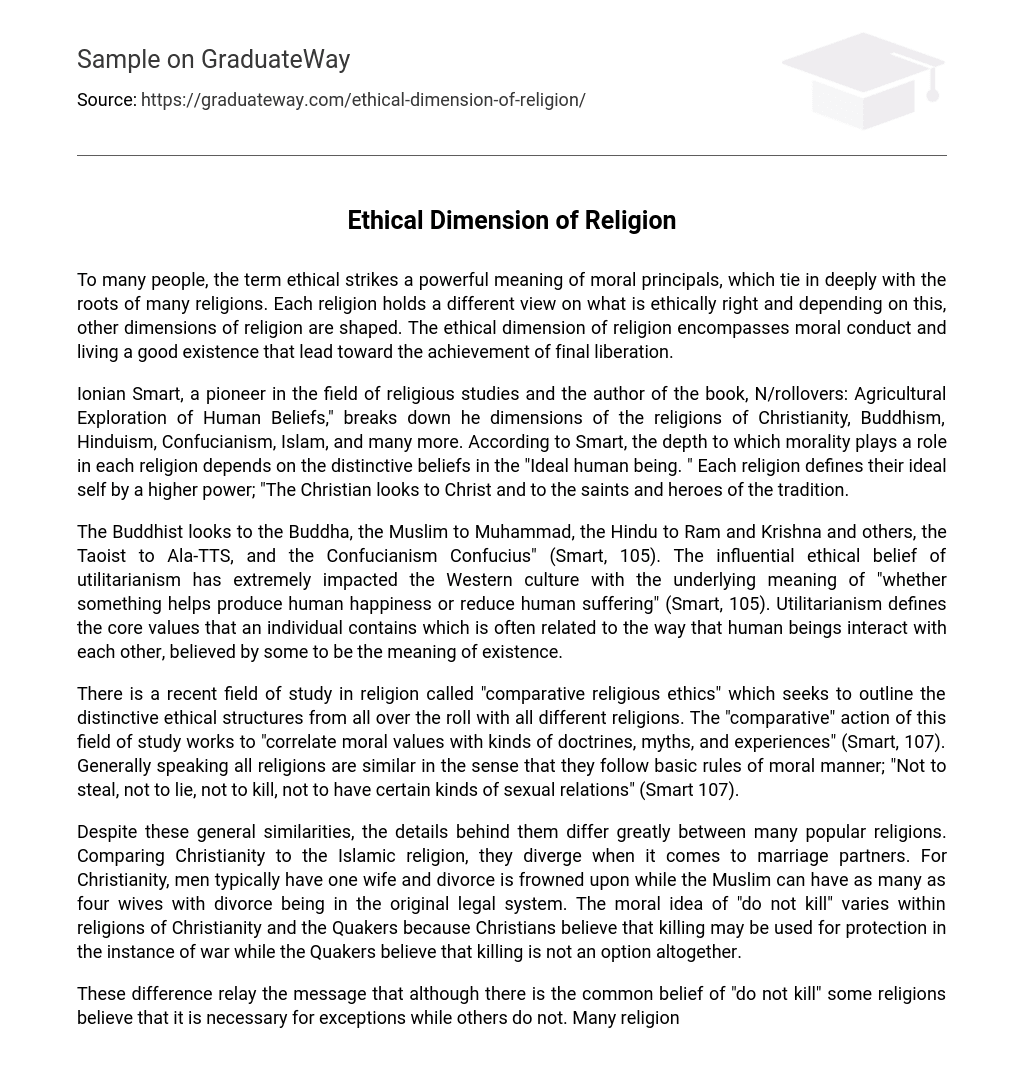The term “ethical” holds a significant meaning for many individuals, relating to moral principles that are closely intertwined with various religious beliefs. Different religions define what is ethically right in their own unique ways, thus shaping other aspects of the religious domain. Within religion, the ethical dimension encompasses behaviors aligned with moral standards and pursuing a virtuous life that ultimately leads to attaining ultimate liberation.
Ionian Smart, a leading figure in the study of religions and the writer of the book titled “N/rollovers: Agricultural Exploration of Human Beliefs,” analyses the various aspects of Christianity, Buddhism, Hinduism, Confucianism, Islam, and other religions. According to Smart, the level of significance morality holds in each religion is determined by their individual beliefs regarding the “Ideal human being.” Each religion envisions their perfect self by deferring to a higher power. Christians draw inspiration from Christ as well as the saints and heroes within their tradition.
The Buddhist seeks guidance from the Buddha, the Muslim from Muhammad, the Hindu from Ram and Krishna and others, the Taoist from Ala-TTS, and the followers of Confucianism from Confucius” (Smart, 105). Utilitarianism, a highly influential ethical belief, has had a profound impact on Western culture by emphasizing the importance of actions that contribute to human happiness or reduce human suffering” (Smart, 105). Utilitarianism shapes an individual’s core values and their interactions with others, often seen as the purpose of life by some.
There is a new area of research in religion known as “comparative religious ethics” that aims to identify unique ethical frameworks across various religions. This field of study examines the relationship between moral values and different aspects such as doctrines, myths, and experiences (Smart, 107). In general, all religions have similarities in that they adhere to fundamental moral principles, such as prohibition of theft, lying, killing, and certain sexual practices (Smart 107).
While popular religions share many similarities, they also have significant differences in certain aspects. One notable contrast can be observed when comparing Christianity and Islam, specifically regarding their views on marriage partners. In Christianity, it is customary for men to have only one wife and divorce is generally discouraged. Conversely, Muslims are allowed to have up to four wives and divorce is permitted according to their original legal system.
Another area of variation exists in religious beliefs concerning the moral principle of “do not kill.” For instance, Christianity and the Quakers hold contrasting perspectives on this matter. Christians believe that killing can be justified in certain situations such as self-defense or during warfare. On the other hand, the Quakers firmly adhere to the belief that killing is never acceptable under any circumstances.
Various religions have different perspectives on the commandment “do not kill.” Some religions allow for exceptions, while others do not. Furthermore, many religions hold a common belief in an afterlife, which can take the form of reincarnation or reaching nirvana, a state of ultimate human perfection. Hinduism follows the moral principles outlined in the “eightfold path” and considers attaining nirvana as life’s ultimate goal.
The quest for enlightenment in Buddhism requires following the law, which is perceived as intertwined with the world and everyday life. Karma, representing the outcomes of one’s actions in present and future lives, holds great significance within this belief system. As Smart (107) explains, karma operates as the “law of reward and punishment” throughout the cycle of rebirth. The moral principles outlined in the “eightfold path” serve as a guiding force for individuals seeking liberation.
The fundamental concept of ethics involves determining what is morally right or wrong and identifying the authority that determines these values. Each religion envisions an ideal human being and determines the eternal destiny after death. While each religion may have specific differences, they all share a common belief in transcending boundaries to recognize the sacredness of individuals (Smart, 117). Upholding moral behavior and leading a virtuous life ultimately leads to achieving ultimate liberation or improving one’s future existence (Smart, 113), thus encapsulating the ethical dimension of religion.





